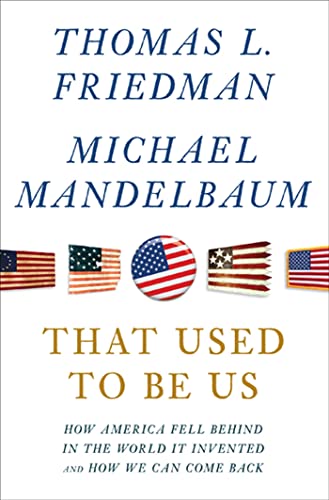That Used to Be Us
How America Fell Behind in the World It Invented and How We Can Come Back
Thomas L. Friedman; Michael Mandelbaum
BOOK REVIEW

In a world racked by constant change and uncertainty, That Used to Be Us: How America Fell Behind in the World It Invented and How We Can Come Back pulls readers into a gripping examination of the American condition through the lenses of two visionary authors, Thomas L. Friedman and Michael Mandelbaum. This is not just a book-it serves as a wake-up call for a nation that once epitomized innovation and opportunity but now grapples with stagnation and decline.
American exceptionalism isn't just a catchy phrase; it's woven into the very fabric of the country's identity. But what happens when that identity is called into question? As Friedman and Mandelbaum argue, America has fallen behind in a world it once dominated, driven by technological advancements and globalization that have shifted the dynamics of competition. They present a compelling narrative that combines intellect with passion, urging readers to confront uncomfortable truths about the socio-economic landscape shaped by their own actions-or inactions.
The authors don't mince words. They craft a narrative that evokes a fierce blend of nostalgia and urgency. You can't help but feel the weight of historical significance, recalling a time when the American dream felt not just attainable, but inevitable. What we face today is a scenario where that dream seems more elusive than ever. The juxtaposition of past triumphs with current tribulations is effectively jarring, compelling the reader to not only reflect on personal aspirations but also to evaluate the greater societal framework that either fosters or stifles opportunity.
Friedman and Mandelbaum's approach reveals a dual narrative: one of caution and one of hope. They identify how America's decline is not a matter of fate but a consequence of choices made-and not made. From failing education systems to a disjointed political structure, the authors dissect the issues plaguing the nation with surgical precision, while simultaneously providing a roadmap for recovery. Their insights challenge readers to rethink their assumptions and consider how they can participate in reclaiming America's lost glory. This book is an emotional rollercoaster; it is incandescent with rage and hope in equal measure.
Critics have found themselves polarized by the book's candid discussions. On one hand, many praise it for its lucidity and passionate call to action, often describing it as essential reading for anyone who cares about the future of the United States. However, there are those who question its feasibility, suggesting that the authors might lean too heavily on idealism without offering concrete solutions. For every glowing review, there's a skeptical voice cautioning against a return to an idealized past that may never have existed.
While the book paints a broad picture, it does not lose sight of personal stories that resonate deeply. These anecdotes-from educators striving to make a difference to entrepreneurs battling against systemic odds-humanize the authors' arguments, reminding us that behind every statistic lies a life. This emotional depth pulls you in, forcing you to confront your own role in the narrative.
The historical context cannot be overlooked. Written in 2011, the book captures a moment when the world was navigating the aftermath of the financial crisis, an economic upheaval that shattered lives and dreams. The authors dig into how this era of uncertainty impacts the younger generation, who now face unprecedented challenges in their quest for security and success. The urgency of their message rings even louder today, as economic inequalities have only worsened and political polarization has reached new heights.
The brilliance of Friedman and Mandelbaum shines through in their ability to inspire action while addressing the collective malaise that has taken root in the American psyche. They implore you, dear reader, to not only observe but to engage.
Instead of wallowing in despair, the book encourages assuming responsibility, advocating for a renaissance of American values, innovation, and community.
In closing, That Used to Be Us isn't just a book that sits neatly on your shelf-it's a dire reminder and a compelling call for a collective awakening. It whispers to us, beckoning us to forge a new path that marries the spirit of innovation with an unwavering commitment to community and responsibility. Are you ready to embrace that challenge? 🌍✨️
📖 That Used to Be Us: How America Fell Behind in the World It Invented and How We Can Come Back
✍ by Thomas L. Friedman; Michael Mandelbaum
🧾 400 pages
2011
#that #used #america #fell #behind #world #invented #come #back #thomas #friedman #ThomasLFriedman #michael #mandelbaum #MichaelMandelbaum